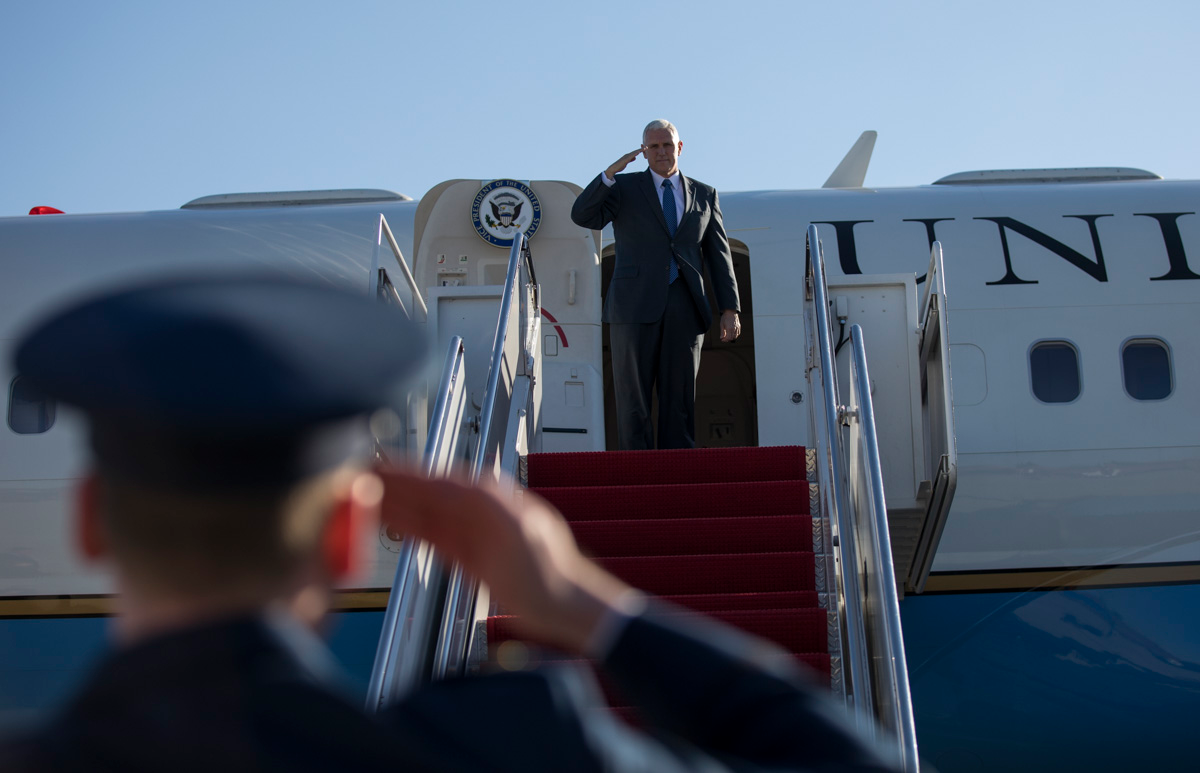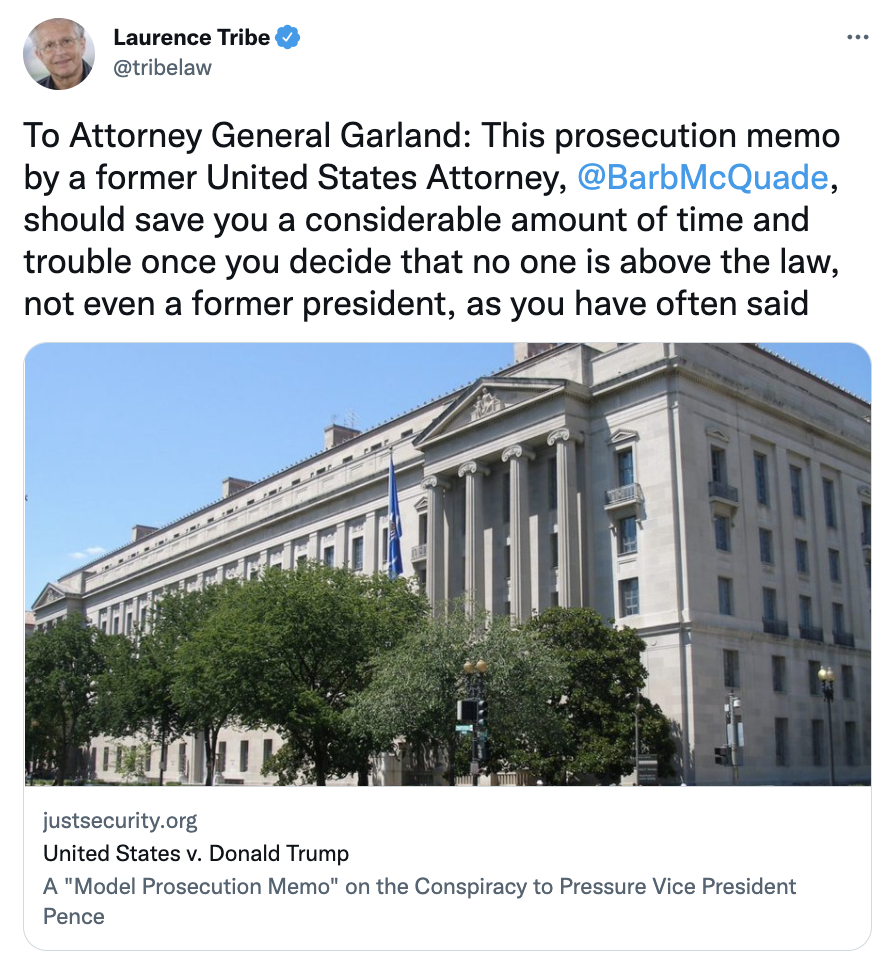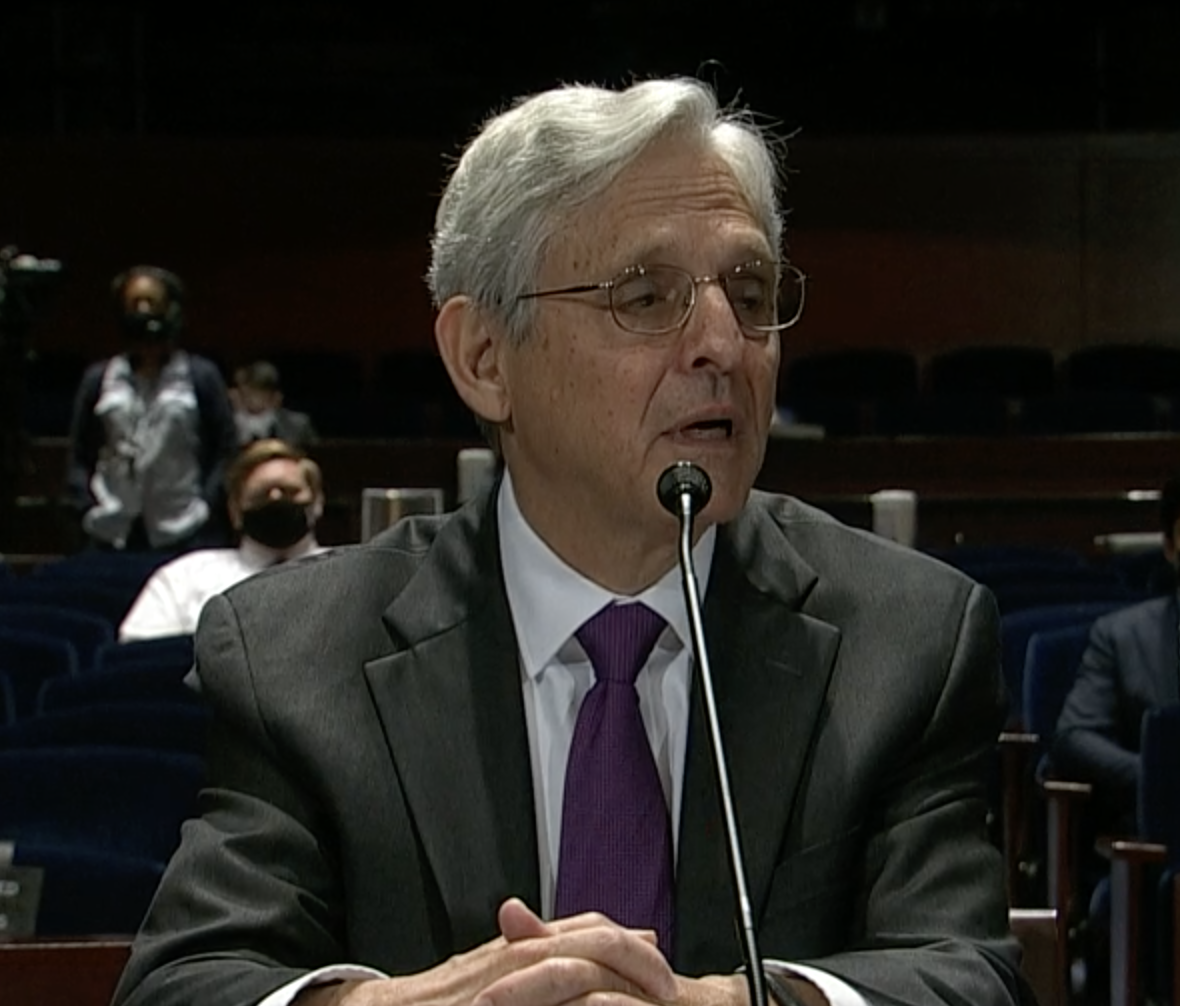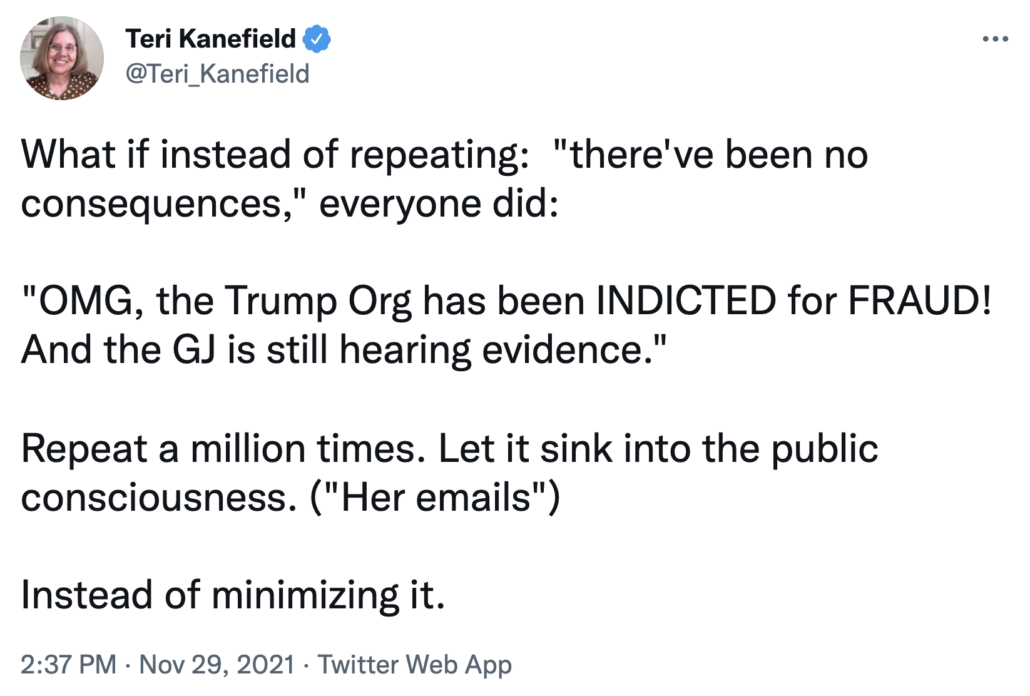The Half of Trump’s Conspiracy to Obstruct JustSecurity Left Out: Inciting an Insurrection
Two days after Judge Amit Mehta ruled that it was plausible that Trump conspired with the Oath Keepers and Proud Boys, JustSecurity has posted an imagined prosecutor’s memo laying out the case that Trump, John Eastman, and Rudy Giuliani (and others known and unknown) conspired to obstruct the vote count that almost entirely leaves out the militias.
It has gotten a lot of attention among the TV lawyer set, who imagine that it would save Merrick Garland time.
With this obnoxious tweet, Laurence Tribe betrays (yet again) that he has completely missed what DOJ has been doing for the past year. What Barb McQuade did is lay out the theory of prosecution that DOJ has long been working on — as I laid out in August. Except that McQuade (of whom I’m a great fan both personally and professionally) misses great swaths of public evidence, and in so doing, makes her case far weaker than it would need to be to prosecute a former President.
Start with McQuade’s argument substantiating that Trump corruptly tried to obstruct the vote count.
Here, attempting to prevent the certification of the votes for president is illegal only it is wrongful or for an improper purpose. It would be wrongful or improper for Trump to seek to retain the presidency if he knew that he had been defeated in the November election. His public statements suggest that he genuinely believed that he had won the election, but, as discussed above, by Jan. 6, it was apparent that there was a complete absence of any evidence whatsoever to support his belief, which at this point had become merely a wish. The statements from Krebs, Barr, Rosen, Donoghue, Ratcliffe, and Raffensperger, and the memo from his own campaign team all permit a fair inference that Trump knew that there was no election fraud, and that his efforts to obstruct the certification was therefore corrupt.
Independently, regardless of his knowledge or belief in election fraud, it was an improper purpose to hold into power after the 50 states had certified their election results, the Electoral College had voted, and litigation had been exhausted after an across-the-board rejection by the federal courts.
This is the theory of prosecution where an obstruction case against Trump would succeed or fail. And I’m not sure it meets the understanding of obstruction already laid out by the judges who would preside over the case.
Defendants have been challenging DOJ’s application of 18 USC 1512(c)(2) to the vote certification since at least April, and so there’s a great deal of background and seven written, one oral, and one minute opinions on the topic:
- Dabney Friedrich (my post on it and the obstruction application generally)
- Amit Mehta (my post on his intransitive application of it to the Oath Keepers)
- Tim Kelly (my post on its application to the Proud Boys)
- Randolph Moss (my post situating his application with his past OLC opinion on charging a President)
- John Bates
- James Boasberg
- My livetweet of Beryl Howell’s oral opinion
- Colleen Kollar-Kotelly
- Richard Leon by minute order
- Christopher Cooper
One of the central issues addressed in these — and something any prosecution of Trump under 18 USC 1512(c)(2) would need to address — is how you establish that the effort to obstruct the vote count is “corrupt.” While thus far all judges have upheld the application, there’s some differentiation in their understanding of corruption (something that a site like JustSecurity might productively lay out).
Two key issues are whether corruption, under 18 USC 1512(c)(2) must be transitive (meaning someone tried to coerce another to do something improper) or intransitive (meaning someone exhibited corruption with their own actions), and the extent to which corruption is proven by doing acts that are otherwise illegal.
Importantly, Judge Friedrich’s opinion, and so the first jury instructions, only extends to illegal actions. In a recent hearing, she warned the Guy Reffitt prosecutors (both of whom also happen to be prosecuting cases charged as a conspiracy) that they will not prove him guilty of obstruction without first proving him guilty of other crimes at the riot.
Trump acted both transitively and intransitively corruptly
McQuade’s formulation is unnecessarily weak on the transitive/intransitive issue. There are at least two things that are missing.
First, citing some tax precedents, defendants wanted the application of obstruction to apply only to those who were obtaining an unfair personal advantage. That’s not the standard adopted in the opinions thus far, but it is a standard that some Justices one day might try to uphold. And while that standard was doable for the charged rioters (because they were attempting to make their own votes count more than the votes of the 81 million people who voted for Biden), it is a slam dunk for Trump. It’s not just that Trump was trying to win an election he knew he lost, he was trying to retain the power of the Presidency for himself. My complaint here, though, is mostly stylistic. McQuade could rewrite this paragraph easily to take advantage of the fact that, for Trump, obstruction of the vote count really was an attempt to gain personal advantage.
It’s in leaving out Trump’s transitive obstruction — even in a piece that focuses closely on the pressure of Pence — where McQuade’s memo could and I think might need to, to pass muster given the existing opinions on it — be vastly improved. That’s because it’s in Trump’s corruption of others where he clearly conspired in illegal acts.
Trump didn’t just do things an ethical President shouldn’t do (intransitive corruption). He carried out an extended campaign to pressure Pence to do something that violated Pence’s Constitutional obligations. That is, he tried to corrupt Pence (transitive corruption).
Trump transitively corrupted by conspiring with people who committed crimes
And it’s in the means by which Trump’s tried to corrupt Pence on the day of the insurrection that McQuade largely leaves out, and in the process forgoes an easy way to meet Friedrich’s current requirement (that those charged with obstruction commit a crime in attempting to obstruct the vote count).
Bizarrely, McQuade’s overt acts on January 6 are focused largely on John Eastman.
T. Trump Speaks at the Ellipse
On Jan. 6, 2021, Trump addressed a crowd of his supporters at approximately 1 p.m. on the Ellipse outside the White House.[129] During his remarks, Trump said, “If Mike Pence does the right thing we win the election.”[130] He explained, “All Vice President Pence has to do is send it back to the states to recertify and we become president and you are the happiest people.”[131] Trump then spoke directly to Pence: “Mike Pence, I hope you’re going to stand up for the good of our Constitution and for the good of our country. And if you’re not, I’m going to be very disappointed in you. I will tell you right now. I’m not hearing good stories.’”[132]
Giuliani, a former United States Attorney, also spoke at the rally. He declared that it would be “perfectly appropriate” for the Vice President to “cast [] aside” the laws governing the counting of electoral votes, and “decide on the validity of these crooked ballots or he can send it back to the state legislators, give them five to ten days to finally finish the work.”[133]
Another speaker at the rally was Eastman. “All we are demanding of Vice President Pence is this afternoon at one o’clock he let the legislatures of the states look into this so that we get to the bottom of it and the American people know whether we have control of the direction of our government or not!” Eastman told the crowd. [134] “We no longer live in a self-governing republic if we can’t get the answer to this question!”[135]
According to reports, Trump was directly involved in planning the speaker lineup.[136]
U. Pence Issues Public Letter Rejecting Eastman’s Theory
On Jan. 6, at 1:02 p.m., Pence posted to Twitter a letter stating that as Vice President, he lacked “unilateral authority to decide which electoral votes should be counted during the Joint Session of Congress.”[137] His duties, the letter stated, were “merely ministerial,” and were limited to counting the votes. The letter further stated that he would instead follow the Electoral Count Act, permitting members of Congress, as “the people’s representatives,” to resolve any disputes.[138] The letter had been drafted with the help of two conservative legal experts — former federal Judge J. Michael Luttig and former Justice Department official John Yoo.[139] Both have confirmed that they advised Pence’s staff and outside counsel that there was no basis for the vice president to intervene in the counting of electoral votes on Jan. 6. “I advised that there was no factual basis for Mike Pence to intervene and overturn the results of the election,” said Yoo, who now teaches law at the University of California at Berkeley. “There are certain limited situations where I thought the Vice President does have a role, for example in the event that a state sends two different electoral results. . . . But none of those were present here.”[140]
Luttig wrote subsequently that “Professor Eastman was incorrect at every turn of the analysis,” including his suggestion that the vice president could delay the electoral vote count.[141]
V. U.S. Capitol Attack Begins
At about 2 p.m., protestors broke a window at the U.S. Capitol and climbed inside.[142] The Senate and House of Representatives soon went into recess and members evacuated the two chambers.[143] At 2:24 p.m., Trump tweeted, “Mike Pence didn’t have the courage to do what should have been done to protect our Country and our Constitution.”[144] The Capitol would not be secured again until about 6 p.m.[145]
Her discussion here doesn’t explicitly mention a single one of the 750 people already being prosecuted for crimes for their actions on January 6. She mentions neither Alex Jones (whom Trump ordered to take the mob on an unpermitted march to the Capitol and two of whose employees are already among those 750 being prosecuted) nor Roger Stone (who has ties to the two militias that orchestrated events that day and who has been a subject in the Oath Keeper investigation from its early days).
It’s not just or even primarily that Trump grasped John Eastman’s crackpot theory and used it to pressure Pence (which is not itself a crime). It’s that he incited thousands of people to take an unpermitted walk to the Capitol to physically threaten Pence and other members of Congress directly.
As I laid out last month, DOJ has already collected a great deal of evidence that those who did break the law at the Capitol did so in response to Trump’s incitement with the motive of pressuring Pence.
Trump led his mob to believe only Pence could help them, and if Pence did, Trump falsely led many of them to believe, it would amount to following the Constitution (precisely the opposite of what his White House Counsel appears to have had told him).
Pennsylvania has now seen all of this. They didn’t know because it was so quick. They had a vote. They voted. But now they see all this stuff, it’s all come to light. Doesn’t happen that fast. And they want to recertify their votes. They want to recertify. But the only way that can happen is if Mike Pence agrees to send it back. Mike Pence has to agree to send it back.
And many people in Congress want it sent back.
And think of what you’re doing. Let’s say you don’t do it. Somebody says, “Well, we have to obey the Constitution.” And you are, because you’re protecting our country and you’re protecting the Constitution. So you are.
That’s what Trump left his mob with as he falsely promised he would walk to the Capitol with them.
So let’s walk down Pennsylvania Avenue.
Already, at that moment, the Proud Boys had kicked off the attack. Moments later, Pence released his letter stating he would certify the vote. “Four years ago, surrounded by my family, I took an oath to support and defend the Constitution, which ended with the words, ‘So help me God.’”
And Trump’s Tweets and speech had the direct and desired effect. When Trump called out, “I hope Pence is going to do the right thing,” Gina Bisignano responded, “I hope so. He’s a deep state.” When she set off to the Capitol, Bisignano explained, “we are marching to the Capitol to put some pressure on Mike Pence.” After declaring, “I’m going to break into Congress,” Bisignano rallied some of the mobsters by talking about “what Pence has done.” She cheered through a blowhorn as mobsters made a renewed assault on the Capitol. “Break the window! she cheered, as she ultimately helped another break a window, an act amounting to a team act of terrorism.
Josiah Colt and his co-conspirators learned that Pence would not prevent the vote certification as Trump demanded. In response, they aimed to “breach the building.” Colt set out to where Pence was presiding. “We’re making it to the main room. The Senate room.” Where they’re meeting.” His co-conspirators Ronnie Sandlin and Nate DeGrave are accused of assaulting a cop to get into the Senate.
Jacob Chansley mounted the dais where Pence should have been overseeing the vote count and declared, “Mike Pence is a fucking traitor,” and left him a note, “It’s Only A Matter of Time. Justice Is Coming!”
Matthew Greene never went to listen to Trump speak. Instead, he was following orders from top Proud Boys, a bit player in an orchestrated attack to surround and breach the Capitol. His goal in doing so was to pressure Pence.
Greene’s intent in conspiring with others to unlawfully enter the restricted area of the Capitol grounds was to send a message to legislators and Vice President KePence. Greene knew he lawmakers and the Vice President were inside the Capitol building conducting the certification of the Electoral College Vote at the time the riot occurred. Green hoped that his actions and those of his co-conspirators would cause legislators and the Vice President to act differently during the course of the certification of the Electoral Vote than they would have otherwise. Greene believed that by unlawfully entering the Capitol grounds, he and other rioters outside the building would send a stronger message to lawmakers and the Vice President inside the building, than if Green and others had stayed outside the restricted area.
There is a direct line of corrupt intent from the moment where Trump asked Pence, “If these people say you had the power, wouldn’t you want to [exercise it]?” and efforts that his mobsters — both those who planned this in advance and those who reacted to Trump’s incitement — made at the Capitol. Some of the most central players in the attack on the Capitol have testified under oath that they understood their goal to be pressuring Mike Pence. In pursuit of that, they broke into the Capitol, they assaulted cops, they occupied the Mike Pence’s seat.
I would add (because Amit Mehta did in his oral ruling that Stewart Rhodes should be detained pre-trial), in addition to the explicit attempt by Kelly Meggs to hunt down Nancy Pelosi, the other group of Oath Keepers appears to have tried to find those in the Senate, presumably including Mike Pence. If prosecutors can prove that, then, the militia that was checking in with Stone the day of the riot took overt steps to physically threaten Mike Pence.
Importantly, with the exception of QAnoner Chansley, all of the January 6 defendants I’ve laid out here were part of a conspiracy (Colt and Bisignano, because they flipped on co-conspirators, are not charged with one). All of these Jan6ers are accused of conspiring with others to carry out Trump’s will to transitively corrupt Pence by physically pressuring him to violate his Constitutional duty.
And Judge Mehta has now ruled it plausible (though he was careful to note he was addressing the lower standard of a civil suit) that Trump’s incitement amounts to entering into a conspiracy with all of these people who acted on his incitement to pressure and in some cases physically hunt down Pence.
McQuade’s theory of corruption may not meet Judge Friedrich’s standard for corruption (which we should assume as a baseline of one that Brett Kavanaugh might find palatable).
Which is why you cannot ignore the other half of the conspiracy: Trump entering into an agreement with Roger Stone to coordinate with the militias, entering into an agreement with Alex Jones to lead the mob to the Capitol, and Trump entering into an agreement with those he incited to directly pressure Pence to violate his Constitutional duty.
750 people have been charged with committing crimes at the Capitol. And the easy way to demonstrate that Trump employed illegal means in his effort to obstruct the vote certification is to point to the mountains of evidence that he conspired both via his close associates Stone and Jones but more directly via incitement with a vast number of those 750 people who allegedly broke the law.
Update: One thing McQuade does focus on (she’s a Michigander who does a lot of work on voter protection) are the fake electors. That’s another illegal act that probably should be brought in any statement of corrupt intent for the same reason Trump’s ties to the rioters should be.
Update, 2/25: Added link to Kollar-Kotelly’s opinion and noted that Leon and Cooper have now ruled.




